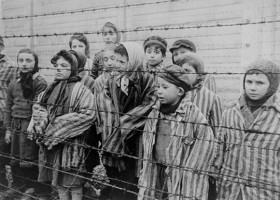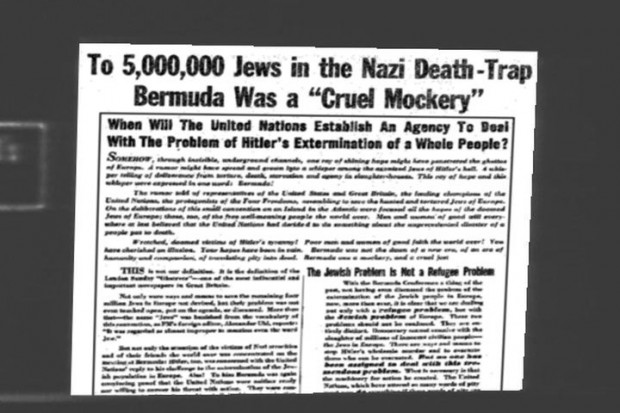Anniversary Of WWII Bermuda Talks Marked
 Scholars of the Second World War [1939-1945] and the state-sponsored extermination programme launched against Jews and other peoples deemed “sub-human” by German dictator Adolf Hitler’s genocidal Nazi regime are marking a grim anniversary this month — the 70th anniversary of the laggardly and deliberately inconclusive Anglo-US Bermuda Conference.
Scholars of the Second World War [1939-1945] and the state-sponsored extermination programme launched against Jews and other peoples deemed “sub-human” by German dictator Adolf Hitler’s genocidal Nazi regime are marking a grim anniversary this month — the 70th anniversary of the laggardly and deliberately inconclusive Anglo-US Bermuda Conference.
The first confirmed reports of Jews being methodically murdered at the Auschwitz death camp in Nazi-occupied Poland had reached outside world in November, 1942 and in December of that year the Allies issued a statement condemning “in the strongest possible terms this bestial policy of cold-blooded extermination.”
Held on the island from April 19 through April 30, 1943, the Bermuda talks between the United Kingdom and the United States were convened as a direct consequence of the Auschwitz reports. The sole topic on the agenda at the Bermuda discussions was the question of Jewish refugees who had been liberated by Allied forces and those who still remained enslaved in Nazi-occupied Europe.
But the Bermuda parlay is regarded by many historians as a squandered opportunity for persecuted Jews given the Allies opted not to take any concerted military action against the Nazis’ vast network of forced labour camps and death camps. Throughout the final two years of the war, British and American officials maintained that bombing Auschwitz and other concentration camps would divert Allied air power from “decisive operations elsewhere.”
The American delegation to Bermuda was headed by Harold Willis Dodds, president of Princeton University; the British delegation, by Richard Law, parliamentary undersecretary of state for foreign affairs. The only agreement made was that the war must be won against the Nazis. US immigration quotas were not raised nor was the UK’s prohibition on Jewish refugees seeking refuge in British Mandatory Palestine — which became the state of Israel in 1948 — lifted.
A week after the conclusion of the conference, the American Zionist Committee for a Jewish Army ran an advertisement in the ”New York Times” condemning the United States efforts at Bermuda for being a mockery of past promises to the Jewish people and of Jewish suffering under Nazi occupation.
Szmul Zygielbojm, a member of the Jewish advisory body to the Polish government-in-exile, committed suicide to protest the foot-dragging Bermuda talks.
Of the nine million Jews who had resided in Europe before the World War Two, approximately two-thirds were killed by the Nazis.
Over one million Jewish children were killed in the Holocaust, as were approximately two million Jewish women and three million Jewish men.
A network of thousands of facilities in Germany and German-occupied European territory were used to concentrate, hold, and kill Jews and other victims.
The full extent of the Nazi extermination programme did not become evident until after Adolf Hitler’s suicide and the subsequent unconditional surrender of Germany to the World War Two Allies on May 7, 1945.
Recent estimates based on figures obtained since the fall of the Soviet Union suggest some 10 to 11 million civilians and prisoners of war were intentionally murdered by the Nazi regime including Gypsies, people with disabilities and homosexuals.
At Yad Vashem — Israel’s official Holocaust memorial — the 1943 Bermuda Conference is remembered with this somber account:
“The purpose of the conference, supposedly, was to deal with the issue of wartime refugees. The real reason the conference was called, however, was to shush the growing public outcries for the rescue of European Jewry without actually having to find any solutions to the problem.
“By the end of 1942, reports confirmed that the Nazis intended to exterminate all of European Jewry. Both in the United States and Britain, Jewish groups demanded that their governments take a stand against the atrocities. The two governments then planned the conference to quiet public opinion, but arranged it so that they would not have to actually make a serious effort to save any Jews. They chose inaccessible Bermuda as the conference’s venue in order to control the number of reporters and private representatives attending. Members of the Joint Distribution Committee and the World Jewish Congress were not permitted to attend.
“The organizers also severely limited the issues that could be discussed.
“They insisted that the Jewish aspect of the problem not be mentioned, and neither government was willing to discuss the ‘Final Solution’. Furthermore, the Americans refused to consider changing their strict immigration quotas to let in more Jewish refugees, while the British refused to consider Palestine as a safe haven for Jewish refugees. They would not even discuss sending food packages to concentration camp prisoners. The Americans also betrayed their lack of seriousness by not sending a high-ranking delegation with the authority to make decisions.
“At the conference itself, the attendees spent much time talking about renewing the Intergovernmental Committee on Refugees, which had been created at the 1938 Evian Conference for the purpose of negotiating with the Germans about refugees. However, the point was moot because, as negotiating with the Nazis was no longer an option, no one was willing to fund the committee. No other solution suggested was deemed acceptable by the two governments, either. Thus, nothing was accomplished, and the Bermuda Conference did not save one Jew.”



As far as I know Members of the Joint Distribution Committee and the World Jewish Congress were invite to come but decided otherwise(source prof. Lilienthal from The Zionist Connection).
It also happened that time that Mr. Greenbaum, head and chief of Jewish Agency has his famous words; “One cow in Palestine is worth more for me than all Jews in Poland/Europe”.
So, who should be blame partly for Holocaust, he?
willy
!NOT ME! I was among the hundereds of students on the stage of Madison Square Garden pagent WE WILL NEVER DIE in March 1943 dressed in rags / faces ashen / moaning repeatidly ” REMEMBER US ” Two years later I was an infantry combat platoon leader racing to cross the Rhine River*** but was wounded and did not get to liberate concentation camps with my outfit 5th Inf. of 71st Div